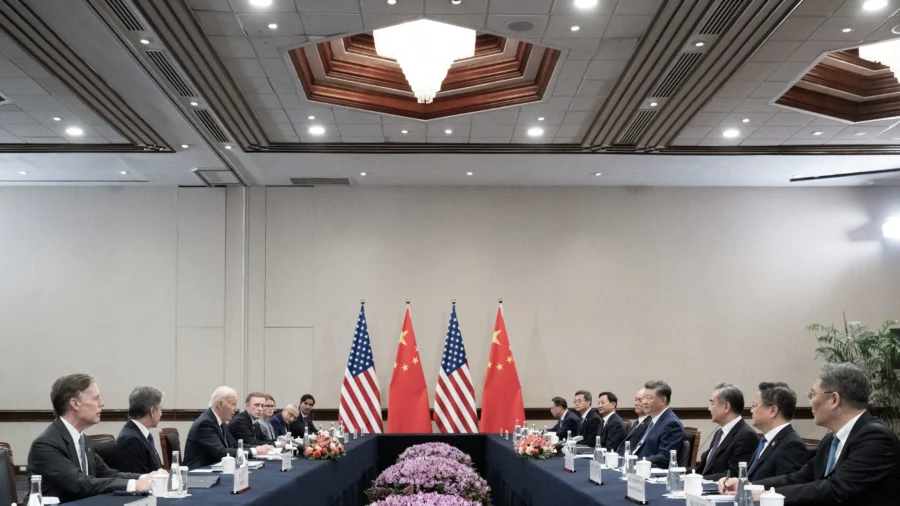President Joe Biden met with Chinese leader Xi Jinping on Saturday for their final in-person meeting of Biden’s presidency. During their discussion, which lasted one hour and 40 minutes, Xi expressed China’s readiness to work with the incoming U.S. administration.
The meeting took place on the sidelines of the Asia-Pacific Economic Cooperation (APEC) summit in Lima, Peru, at the hotel where Xi was staying.
During his opening remarks, Xi told Biden, “The United States has recently concluded its elections. China’s goal of a stable, healthy, and sustainable China–U.S. relationship remains unchanged.”
“China is ready to work with the new U.S. administration to maintain communication, expand cooperation, and manage differences, so as to strive for a steady transition of the China–U.S. relationship for the benefit of the two peoples.”
White House national security adviser Jake Sullivan told reporters after the meeting that Biden and Xi covered a wide range of issues, describing their discussion as “candid” and “constructive.”
Biden told Xi that “he has worked hard to responsibly manage the competition” with China for the past four years to prevent it from spiraling into conflict, Sullivan said.
Both leaders are committed to responsibly managing this relationship during the critical transition period, he added.
The two leaders also spoke about “areas of friction,” Sullivan said, citing China’s support for Russia’s defense industrial base, military activity around Taiwan, unfair trade policies, and increasing aggression in the South China Sea.
Biden and Xi also touched on China’s relationship with North Korea, particularly as U.S. and Western intelligence assessments indicate North Korea has deployed troops to assist Russian forces in their ongoing war with Ukraine.
During the meeting, Biden expressed “grave concern” about North Korea’s involvement, Sullivan said.
The White House earlier indicated that the United States and its allies—South Korea and Japan—believed “China has a role to play” in dissuading the growing Russia-North Korea partnership.
Trump’s Return
President-elect Donald Trump’s impending return to the White House also loomed large over the Biden–Xi meeting.
Trump has repeatedly signaled he will employ tariffs of up to 60 percent on made-in-China products arriving in the United States.
Trump is also set to staff his incoming administration with several China hawks. He has already named Sen. Marco Rubio (R-Fla.) and Rep. Michael Waltz (R-Fla.)—two staunch China critics—as his picks for secretary of state and national security adviser, respectively.
Beijing sanctioned Rubio twice in 2020 and banned him from entering China.
Sullivan declined to comment about Beijing’s reaction to Trump’s tariff plan.
“Look, I’m not going to comment on a future administration’s policies that have neither been formulated nor articulated,” he told reporters. “What I will say is that we have laid out in clear terms our concerns about non-market economic practices that the PRC has undertaken.”
Sullivan defended U.S. tariffs on Chinese goods, stating that many countries have taken measures to address China’s overcapacity problem in critical sectors.
Biden’s China Record
The two leaders last met on the margins of the APEC leaders’ summit in San Francisco on Nov. 15, 2023.
After the meeting, both countries reinstated military-to-military communications to help prevent escalatory confrontations. Sullivan said that since the last meeting, both countries have also made some progress in curbing illicit narcotics flowing from China and developing a shared understanding of the risks associated with emerging artificial intelligence technology.
In the last meeting, both sides agreed to prevent artificial intelligence (AI) from having control over nuclear weapons.
“The two leaders affirmed the need to maintain human control over the decision to use nuclear weapons,” according to the readout from the White House. “The two leaders also stressed the need to consider carefully the potential risks and develop AI technology in the military field in a prudent and responsible manner.”
During his last meeting with Xi, Biden also brought up the issue of U.S. citizens being detained in China.
“I don’t have any announcements to make, but they had an important discussion on the subject today, and we’ll continue working every day until our very last to try to secure the release of the unjustly detained Americans,” Sullivan said.
Biden also raised the issue of rising cyberattacks by China-linked hackers.
The FBI and the U.S. cyber watchdog agency CISA announced recently that China-linked hackers compromised the networks of “multiple telecommunications companies” and stole surveillance data intended for American law enforcement agencies.
Sullivan declined to comment on the specifics of what Biden and Xi discussed regarding the latest cyberattack.
From The Epoch Times

